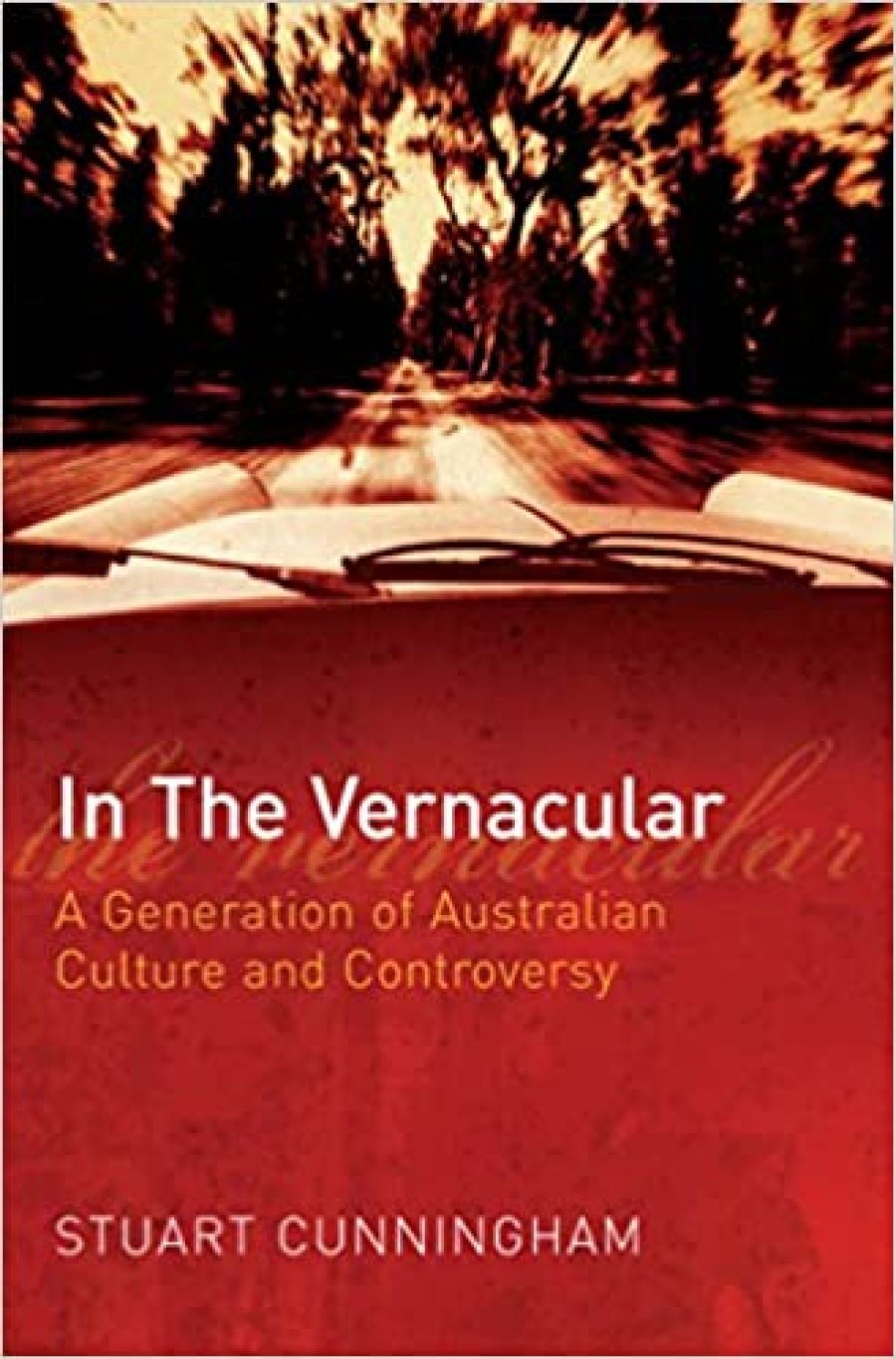
- Free Article: No
- Contents Category: Society
- Review Article: Yes
- Online Only: No
- Custom Highlight Text:
‘I never thought Australia needed culture of any kind,’ drawls Barry Humphries in Not Quite Hollywood, Mark Hartley’s recent documentary on Australian ‘trash’ cinema of the 1970s and 1980s. Perverse aesthete that he is, Humphries cannot resist the idea that lack of refinement might be a sign of vitality: ‘Culture is yoghurt, isn’t it, or mould? It grows on decaying things.’
- Book 1 Title: In the Vernacular
- Book 1 Subtitle: A generation of Australian culture and controversy
- Book 1 Biblio: UQP, $45 pb, 294 pp
Given his social-democratic politics and innate scepticism, Cunningham has never had much truck with the view of high culture as a civilising force espoused by the likes of Matthew Arnold or F.R. Leavis. Nor is he mainly interested in championing the ‘subversive’ aspects of popular culture, or in showing how audiences have appropriated ideologically suspect works for their own purposes. Far from automatically pouring scorn on ‘dominant’ values, he’s pragmatically committed to working within existing institutional contexts, while ensuring that marginalised cultural groups and forms of expression receive, in that hackneyed but not quite empty Australian phrase, a fair go.
As a critic, Cunningham seems especially drawn to artefacts visibly composed of separate temporal and formal layers: from the early films of pioneer Australian director Charles Chauvel to the historical miniseries produced by the Kennedy–Miller company in the 1980s, to the Vietnamese diasporic music videos which he analyses (in an article written with Tina Nguyen) as instances of ‘actually existing hybridity’. Through his interpretations, all of these emerge as incoherent yet potent texts that, in effect, dramatise the circumstances surrounding their own production, ‘staging’ and thus managing social dilemmas which remain unresolved.
It is surely no coincidence that the present volume can also be read as a layered and fissured text of this kind. Though the essays are arranged in roughly chronological order, the book as a whole is less narrative than palimpsest, with Cunningham’s earlier, unrevised positions and arguments visible beside or beneath his most recent. It is as if In the Vernacular, like many of its objects of study, seeks to display in microcosm some of the historical complexities and contradictions that belong to the idea of the nation. For Cunningham, ‘Australia’ remains the master text and the arena where, for better or worse, most cultural initiatives must be carried out.
In his firm commitment to the national, Cunningham has his affinities with Chauvel’s melodramatic yearning for ‘plenitude of meaning’ and with the kind of ‘utopian mythologising’ seen at its most benign in Gillian Armstrong’s 1982 feminist musical Starstruck. Yet Cunningham is always ready to deploy a consciously prosaic rhetoric against the grand narratives of conservatism and radicalism alike. Writing on the ‘house style’ of Kennedy–Miller, he approvingly notes that ‘the bardic, or ritual, function of these television histories implies no one political or ideological position but a multiplication and historicisation of them’.
Of course, the danger of such pluralism is that it can leave the ‘engaged advocate’ with little territory to defend. Cunningham’s confident and wholly traditional praise of Kennedy–Miller’s Vietnam as ‘the most achieved Australian mini-series’ has to be borne in mind when, much later, he throws up his hands in despair of finding any generally acceptable account of culture’s intrinsic importance, even citing George Steiner’s old saw about the Nazis and their love of Mozart. From such dark nights of the soul, any awakening is better than none, and so the last part of the book finds him beating the drums for culture as an economic good, plunging into the brave new world of the ‘creative industries’ in the age of ‘convergence, globalisation and digitisation’.
Sympathetic as one may be, it is hard not to cringe as Cunningham cheerfully cites a Queensland government strategy document titled ‘Creativity Is Big Business’, or calls for ‘campaigns targeting young people with the message that knowledge entrepreneurship ... is an attractive and viable option’. Certainly, we are a long way here from cultural studies’ founding concept of ‘a whole way of life’ created and sustained by an entire society rather than by a single designated class. Perhaps the posture adopted here is best described as an inverted dandyism. Always a fluent and subtle rhetorician, Cunningham demonstrates his ability not simply by writing ‘well’ but by using a particularly clunky form of business jargon to smite the philistines with their own weapons (in theory, at least). This is the tactic which he describes, in a phrase borrowed from the ‘femocrat’ Hester Eisenstein, as ‘taking the rhetoric of the liberal democratic state at its word’. It is also the ‘cheekiness’ which Meaghan Morris points to in the book’s introduction.
Cunningham remains likeable partly because of this manner, and partly because beneath all the double-talk one keeps catching glimpses of an unrepentant humanism. Even as he talks up the ‘knowledge entrepreneurs’ of tomorrow, he offers the following, almost as an afterthought: ‘It is always open season on the arts and culture in Australia, because they are intimately bound up with controversial inquiries into meaning, purpose and human understanding.’ Humphries might smile, but Leavis couldn’t have said it better.


Comments powered by CComment